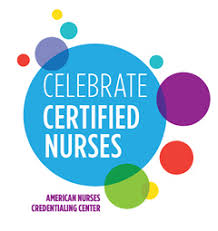Nurses looking to advance in their careers and in the quality of patient care they deliver can look to certification to provide both.
March 19 recognizes National Certified Nurses Day, and many nurses find certification provides an opportunity to gain focused, crucial knowledge and skills that make them better nurses.
Which nurses should attain certification? Any nurse who wants to gain additional training in a specialty should reach for becoming certified. Certification is available in dozens of specialties from cardiac to pediatric, and nurses aren’t restricted to only one certification. You can obtain certification as a Family Nurse Practitioner, a Certified Pediatric Nurse, a Certified Urologic Registered Nurse, a Cardiac Vascular nurse, and many others.
Why is there a day devoted to nurses who take this step? Certified nurses have shown a personal and professional commitment to their career and the nursing profession in general. They have chosen to achieve, and exceed, the highest non-degree level of expectation toward a specific area.
Should you become certified? If you’ve been in your role for a while and are ready to take on additional responsibilities, certification offers that opportunity. What if you’ve been thinking of taking a new path in nursing and switching into another area? Certification can help you by giving you opportunities to learn and gain expertise.
Certification generally requires a couple of years of nursing experience in the designated area before you can be qualified to take a certification exam. Nursing students can keep the goal in sight while they are gaining practical experience. That experience allows you to develop a solid foundation of clinical nursing practice, especially in the area of certification you want to earn.
When you’ve decided that becoming a nurse with certification is a good step for your career and for the level of care you provide to your patients, you’ll need to map out a preparation plan. You can begin by asking your colleagues who are certified what they did to prepare and any tips they might have to share. They can also be a steady source of encouragement through the process. Talk with your supervisor about your plans to take the certification exam, too.
Nurses who want to earn certification credentials generally start preparing for the exam months in advance. There are study guides available to help. And, despite the anxiety that taking a test like this can sometimes trigger, preparation will be a big help in your final score.
If you’ve already achieved advanced credentials in a specialty or a subspecialty, you’ve shown a dedication to your profession that is public, recognized, and respected. Generally, certification can help nurses who want to assume greater responsibility, greater leadership, and, often, a salary boost.
National Certified Nurses Day honors nurses who have met this additional, and rigorous, challenge. It also inspires nurses who haven’t achieved certification yet to take that next step—whether it is deciding to take the leap, applying for a certification exam, or beginning to study for the test.
To all certified nurses—your work is appreciated by patients and colleagues around the globe.
- Is the FNP Program Right for You? - April 24, 2024
- WOC Nurses Week Highlights Specialty - April 16, 2024
- Honoring Radiology Nurses Day on April 12 - April 12, 2024



